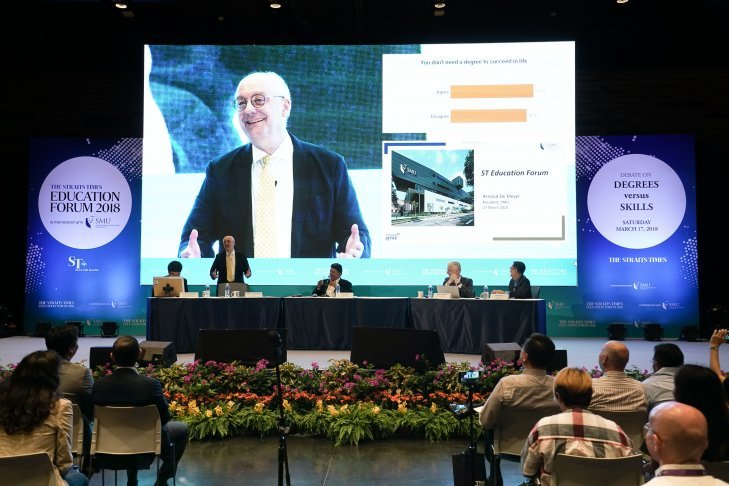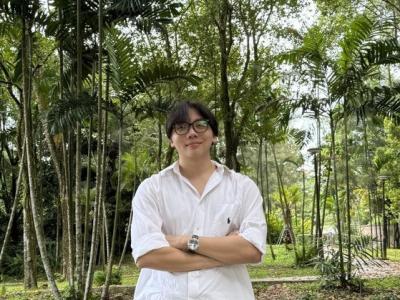
The Straits Times Education Forum, in partnership with the Singapore Management University (SMU), returned this year with a stimulating debate motion, ‘You don’t need a degree to succeed in life’.
Arguing for the motion were Mr Andreas Schleicher, Director for Education and Skills from the Organisation for Economic Co-operation and Development, and Mr Ng Cher Pong, Chief Executive for SkillsFuture Singapore. They squared off against the opposing team comprising Professor Arnoud De Meyer, President of SMU and Associate Professor Goh Yihan, Dean of SMU School of Law.
The half-day Forum this year was attended by about 500 educators and students, mostly from junior colleges, polytechnics, IB and international schools, as well as students’ parents, ST readers and members of the public.
During a lively Q&A dialogue, members of the audience raised a constant stream of questions. The topics tackled during the session ranged from whether failure was a good way of learning, to the ways in which to thrive in workplace disrupted by globalisation and technological changes.
The full story published in The Straits Times (18 March 2018) is enclosed:
Skills v degrees debate at ST Education Forum ends in a tie
By Fabian Koh
The question of which matters more for success in life - holding a degree or mastering skills - has finally been answered, and it is a tie.
At The Straits Times Education Forum yesterday, organised in partnership with the Singapore Management University (SMU), the motion "You don't need a degree to succeed in life" was debated.
Mr Andreas Schleicher, director for education and skills at the Organisation for Economic Cooperation and Development (OECD), and SkillsFuture Singapore chief executive Ng Cher Pong argued for the motion, while SMU president Arnoud De Meyer and the university's law dean Goh Yihan stood against.
The debate, moderated by Singapore Press Holdings consultant Patrick Daniel, involved the 500-strong audience voting for or against the motion in real time, according to how they were swayed as the session went on.
Made up of students, educators, parents and Straits Times readers, the audience at the SMU School of Law building voted 65.4 per cent in favour of the motion and 34.7 per cent against it at the start.
However, by the end of the session, it was 50 per cent for as well as 50 per cent against the motion.
OECD director for education and skills Andreas Schleicher said it is flawed to equate education and learning with a university experience.
Mr Schleicher started by singling out successful people who were university dropouts and "unsuccessful in formal education", such as inventor Thomas Edison, Facebook founder Mark Zuckerberg and Microsoft founder Bill Gates.
But Professor De Meyer pointed out that the group of people who are successful without a degree was extremely small, or infinitesimal, as he put it.
He added that every member on the debate panel held a degree, and questioned if they would be there if they did not.
Associate Professor Goh said the late Apple chief Steve Jobs, although a university dropout, had benefited from his time in university.
"If he had not attended that calligraphy course in university in his broad-based educational experience, we would not have proportionally spaced phones, or multiple typefaces on our Macs," he argued.
The team supporting the motion also pointed out that new jobs are appearing, and university degrees may not have sufficiently prepared graduates for them.
Mr Schleicher said skills attained at the point when the degrees were awarded may not be relevant any more.
Mr Ng noted: "We see job titles today that did not exist 10 to 15 years ago, but are now fairly commonplace, like game designers, cyber-security specialists, data scientists and even drone operators."
He questioned if degrees should have a sell-by date, since skills are so quickly becoming obsolete.
The team arguing against the motion said that in the course of pursuing a degree, one would pick up soft social skills, and not just hard skills.
Prof Goh said a degree is "but an indication of the entire university experience". It is not just a paper qualification but caps years of learning soft skills such as building one's confidence, finding one's passion and honing one's leadership abilities.
Prof De Meyer, sharing his experience of working in different countries in various roles, said the pursuit of a degree helped him in adapting to new challenges.
Mr Ng pointed out that intangible qualities such as passion and having a growth mindset are "not necessarily attributes that are acquired and certified in a degree".
In his opening address, Straits Times editor Warren Fernandez said the traditional mentality that a degree was needed to get ahead in life seemed to be undergoing a shift, due to disruptions in various sectors by entrepreneurs and technopreneurs.
"We are in this quandary - do you need a degree or do you not need a degree? We are trying to grapple with where the truth really lies.
"As with most things in life, it's probably somewhere in the middle. But exactly where in the middle? I think that's what we are here to debate today."
Mr Fernandez, who is also editor-in-chief of Singapore Press Holdings' English/Malay/Tamil Media Group, added that such a debate was important to highlight the need for "thinking, inquiring, sceptical minds, which are also open to the possibility of alternative views and alternative perspectives".
SOFT SKILLS CRUCIAL, BUT BEING COMPETITIVE NOT A BAD THING
The question-and-answer segment of The Straits Times Education Forum yesterday, which lasted about 30 minutes, saw a lively exchange between audience members and the debaters.
Below are two questions from the floor and the answers that touched on identifying those with good soft skills for a job and why being competitive is not the same as pursuing grades.
Q While it is easy to identify what degree someone graduated with, it is hard to identify the soft skills they possess. How can people who are good in certain soft skills be identified in the marketplace by prospective employers?
Andreas Schleicher: It's true that just because you have a degree qualification, it doesn't automatically imply that you have the social skills. Employers are often good at recognising knowledge and skills. There are also instruments now that can help employers look at a broad range of cognitive ability and social skills.
We need to become better at observing the competence which people actually have at the workplace. If you look at some employers from high-tech companies, they are actually quite good at that already.
Q Due to the competitive mindset of the current society, especially in a country like Singapore, a lot of us focus on getting a top grade. Does that, in the end, have a negative effect on our personal and social development in university?
Arnoud De Meyer: I think grades are important as they tell you something about what you're good and bad at. But pursuing grades is wrong.
To be competitive is okay, because the world is competitive. It actually prepares you for a competitive world. In the professional world, not everybody will get a pass grade. Some of us will do better than others. It is an obligation, I think, for the university to give you a feeling of where you're standing among your peers.
Source: The Straits Times © Singapore Press Holdings Limited. Permission required for reproduction.
[Featured photo: (From left) SMU law dean Goh Yihan and SMU President Arnoud De Meyer argued against the motion "You don't need a degree to succeed in life" at the Straits Times Education Forum on 17 March 2018. On the opposing team were OECD director for education and skills Andreas Schleicher and SkillsFuture Singapore chief executive Ng Cher Pong.]

